THE ILLUSTRIOUS LIFE OF MUHAMMAD By Dar as-sunnah
THE ILLUSTRIOUS LIFE OF MUHAMMAD By Dar as-sunnah
Publisher:
Dar As Sunnah Publications
Author:
IMAM IBN al JAWZI
Language:
English
Binding:
Hard Cover
Pages: 144
Size: A5 |5.8 x 8.3 in| 14.8x 21 cm
Couldn't load pickup availability
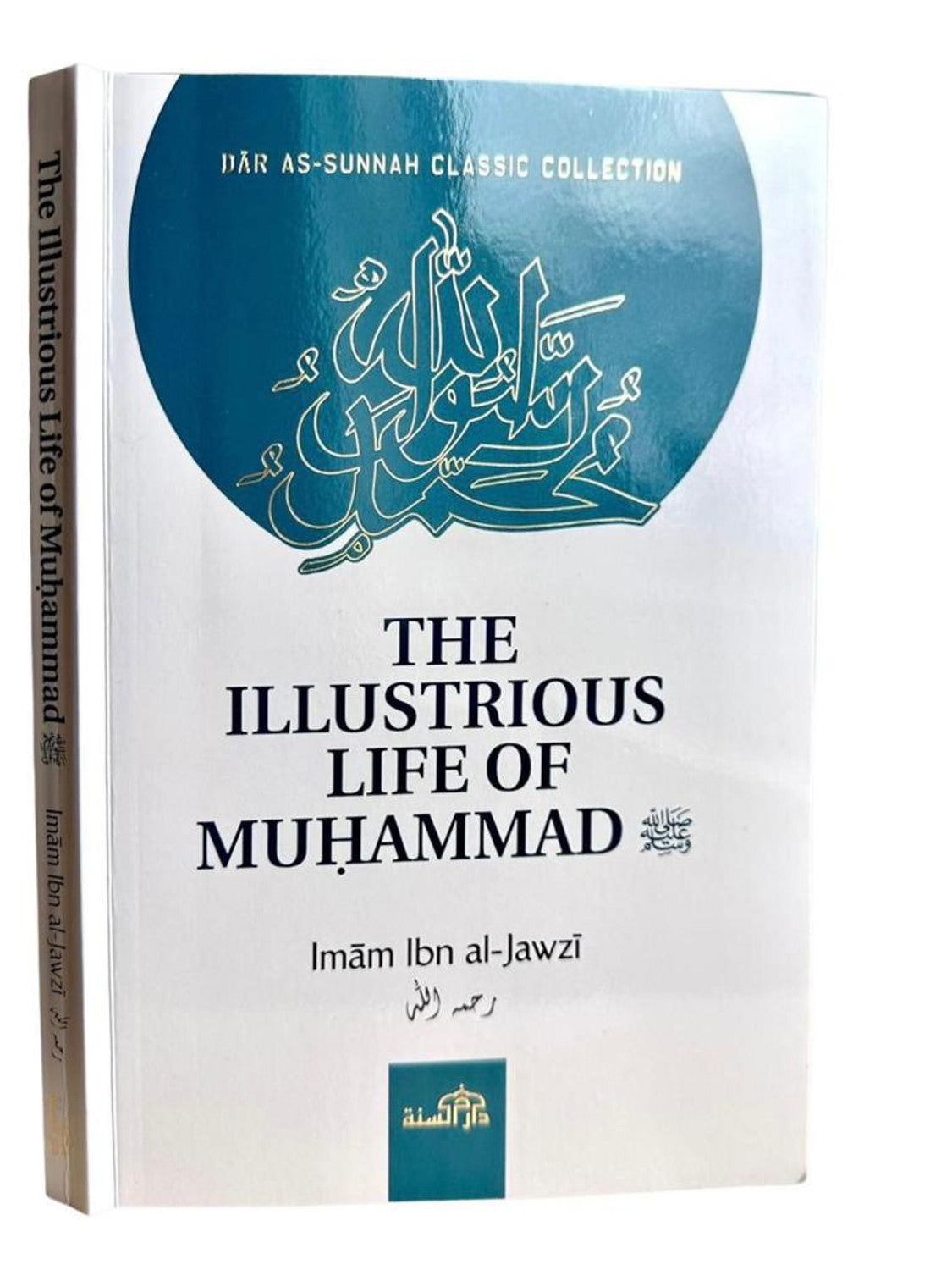
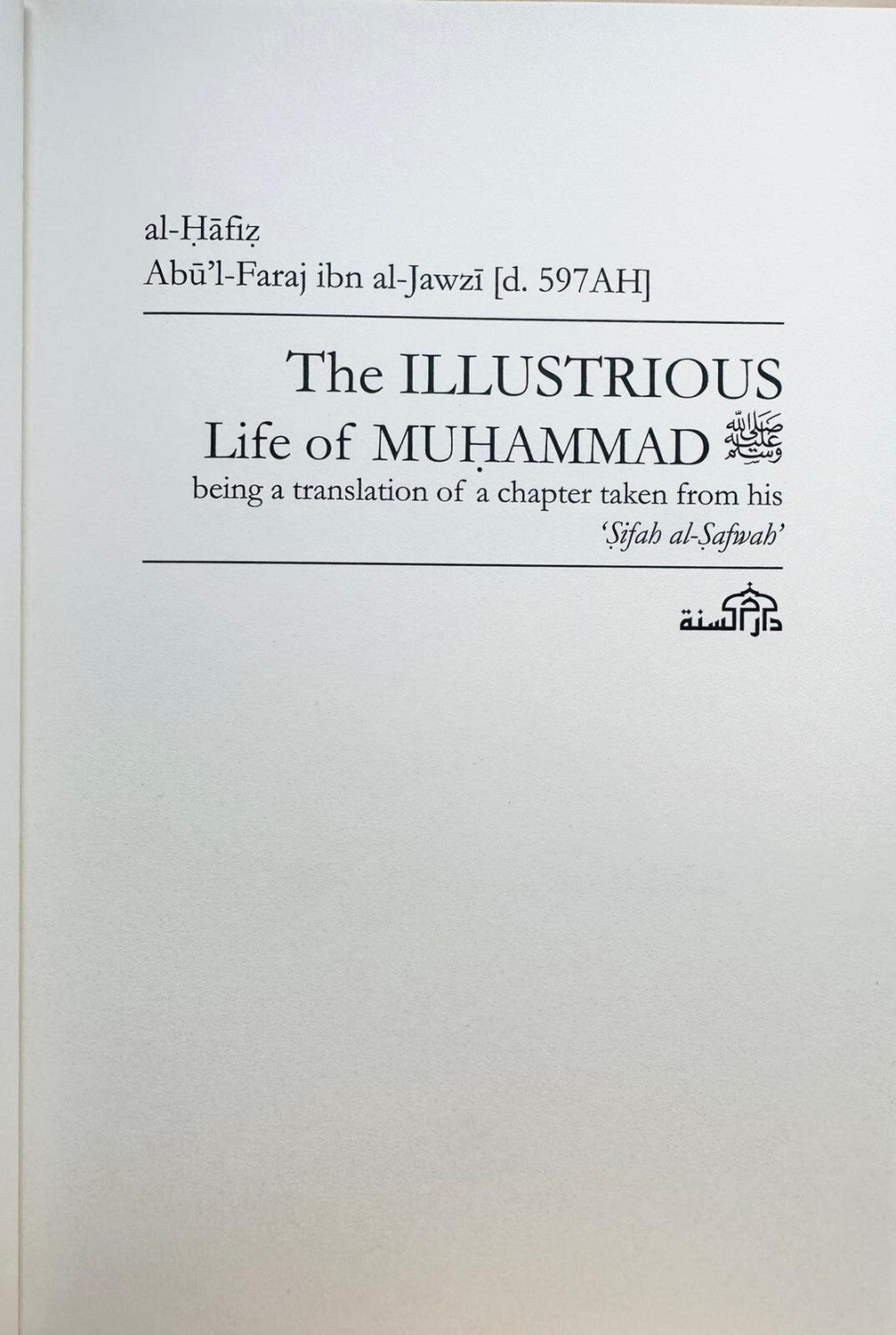
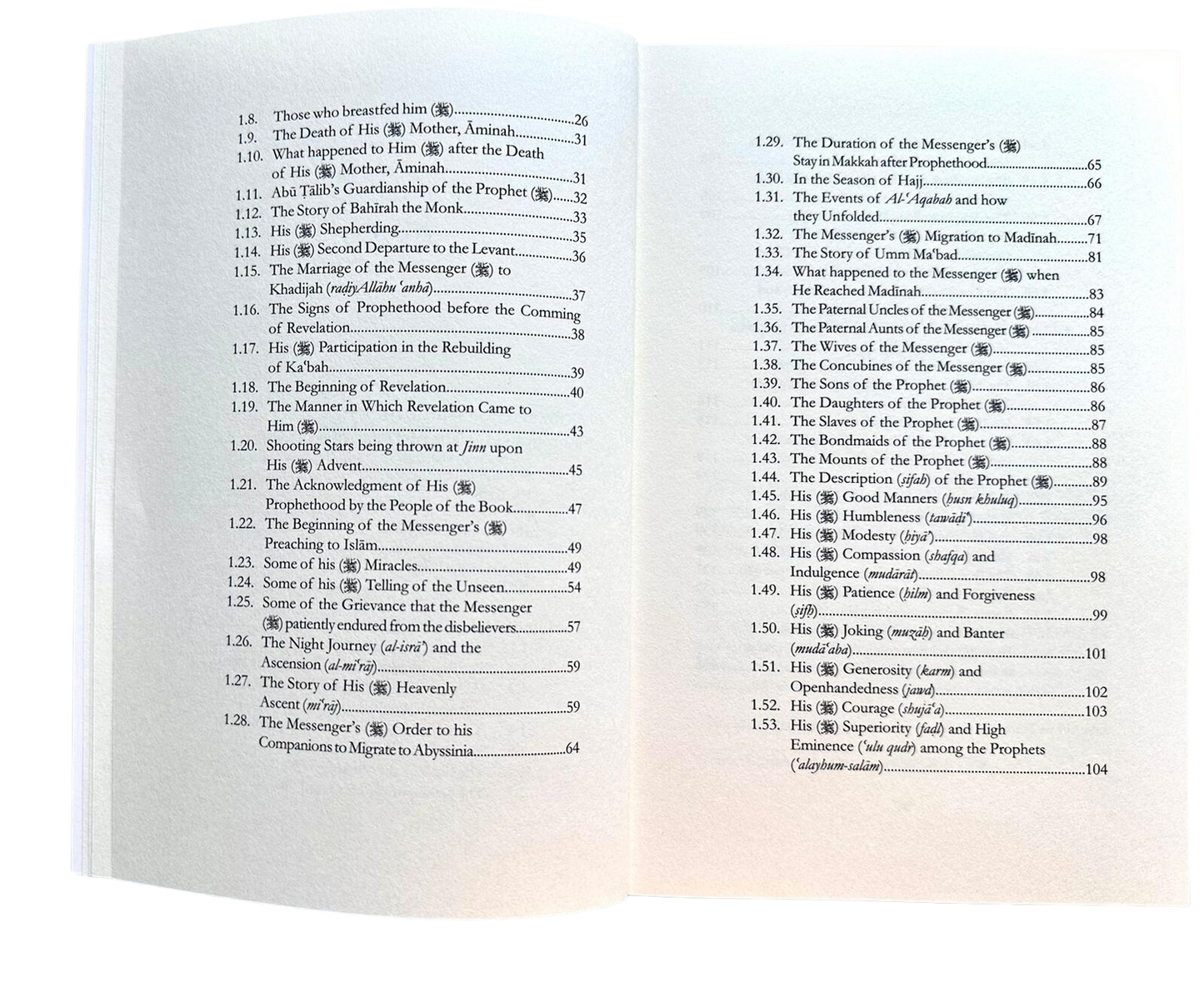
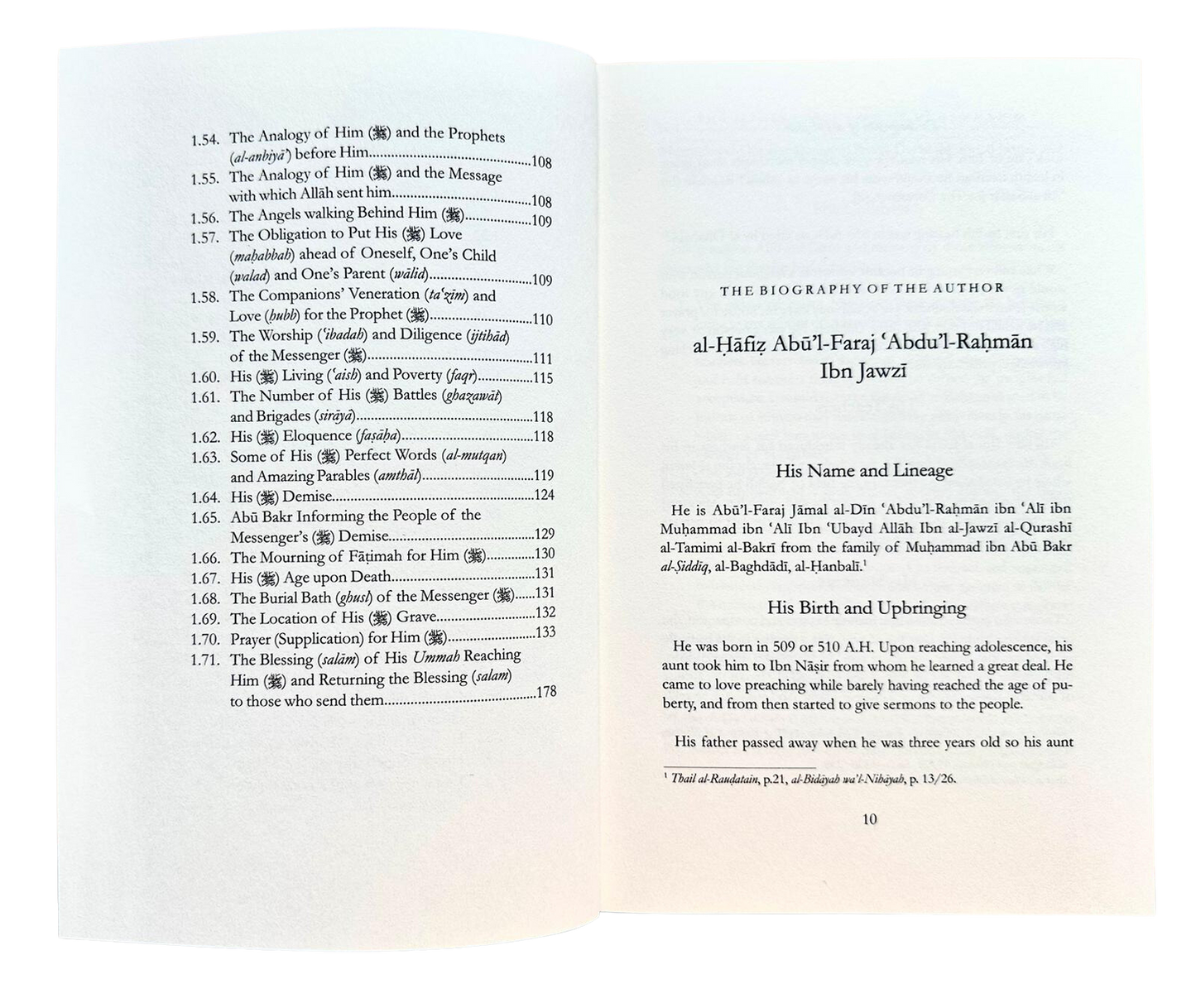
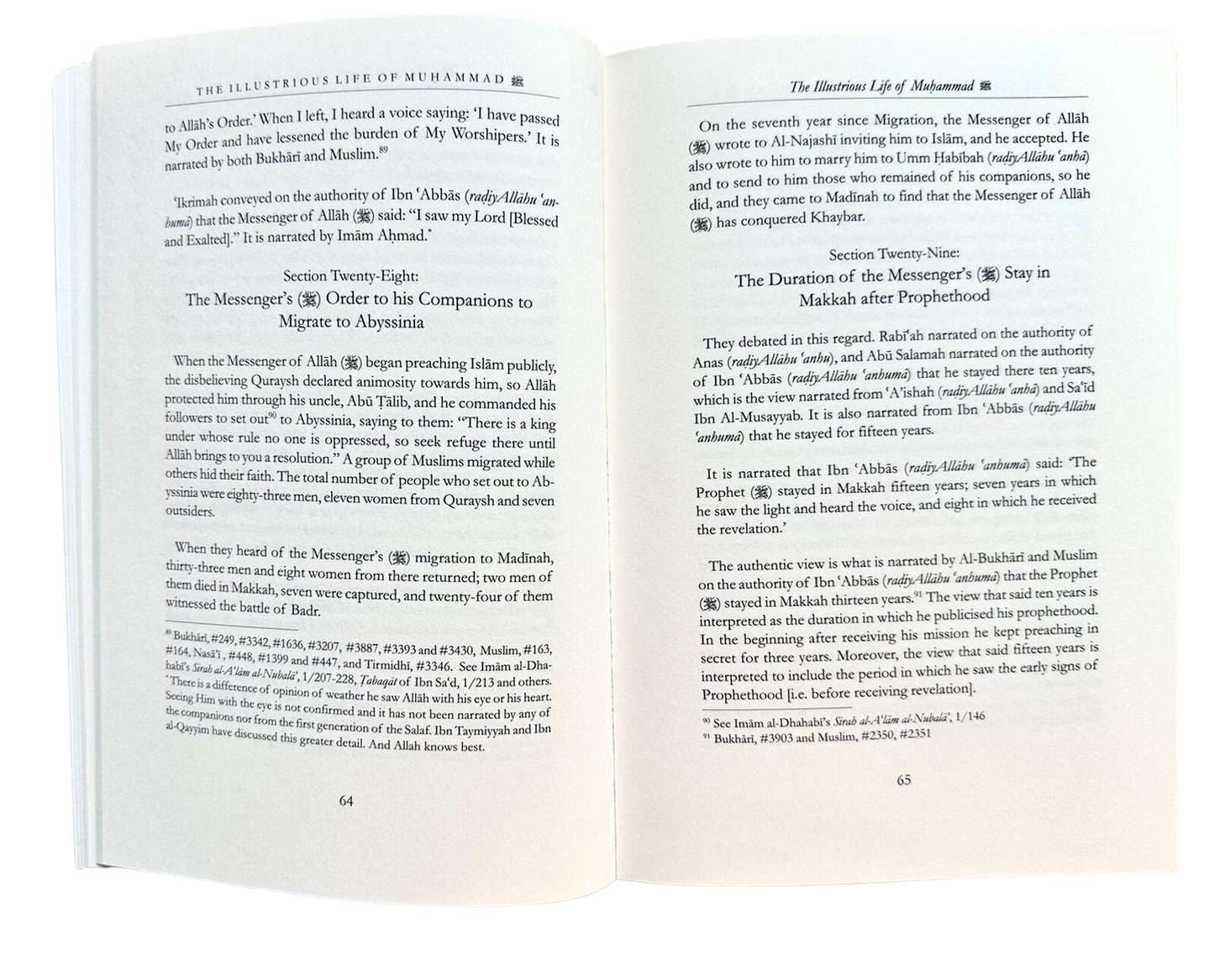
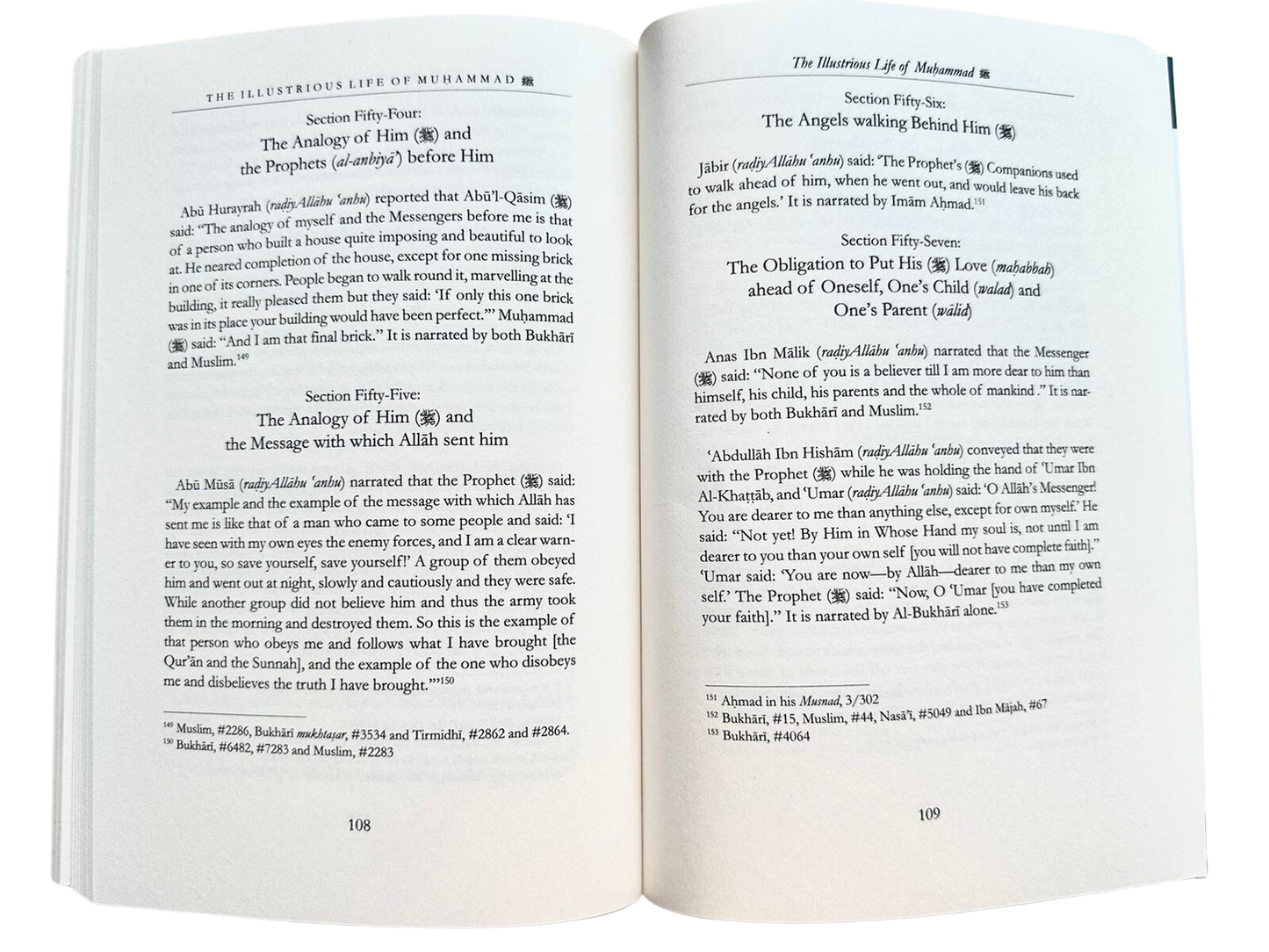
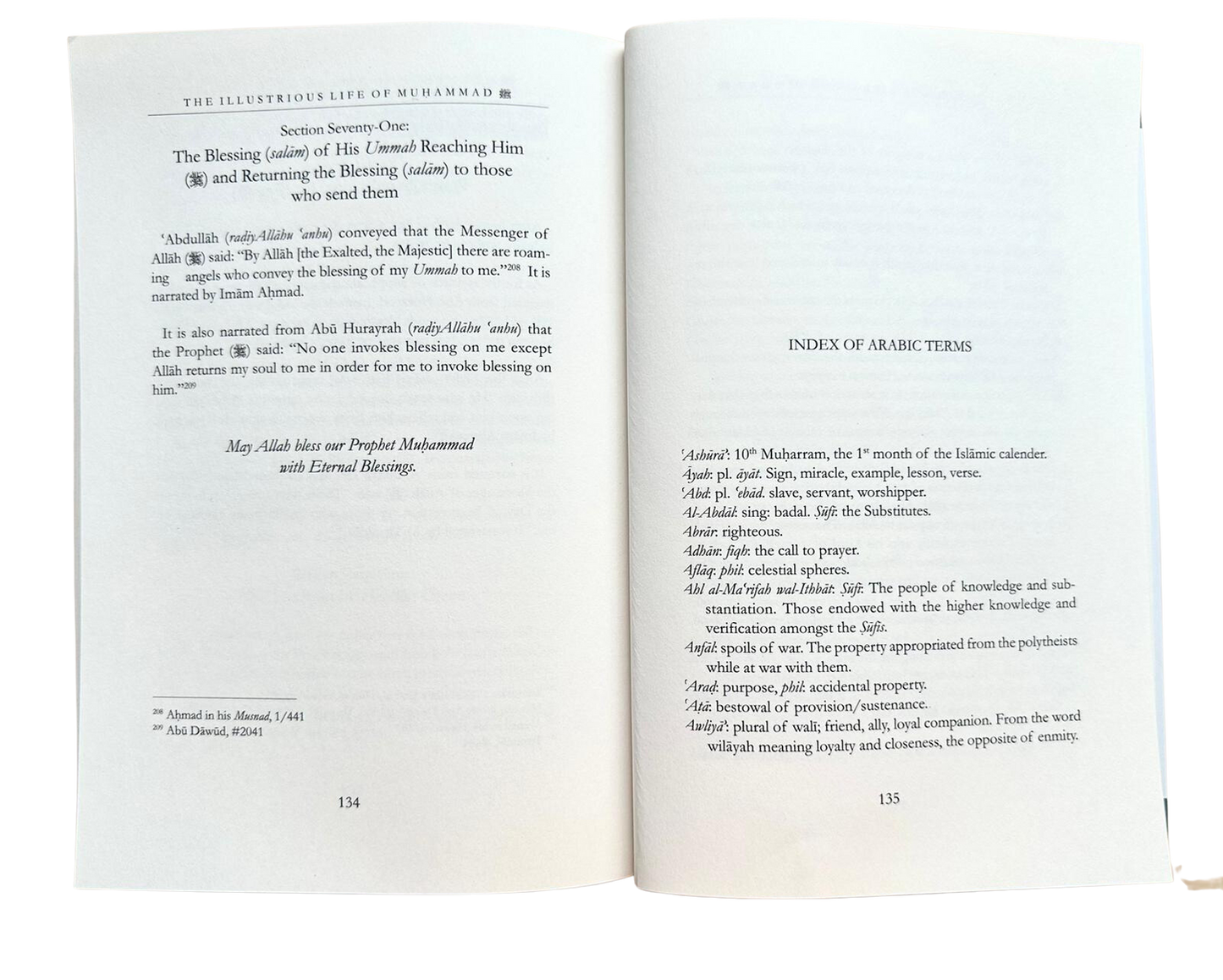
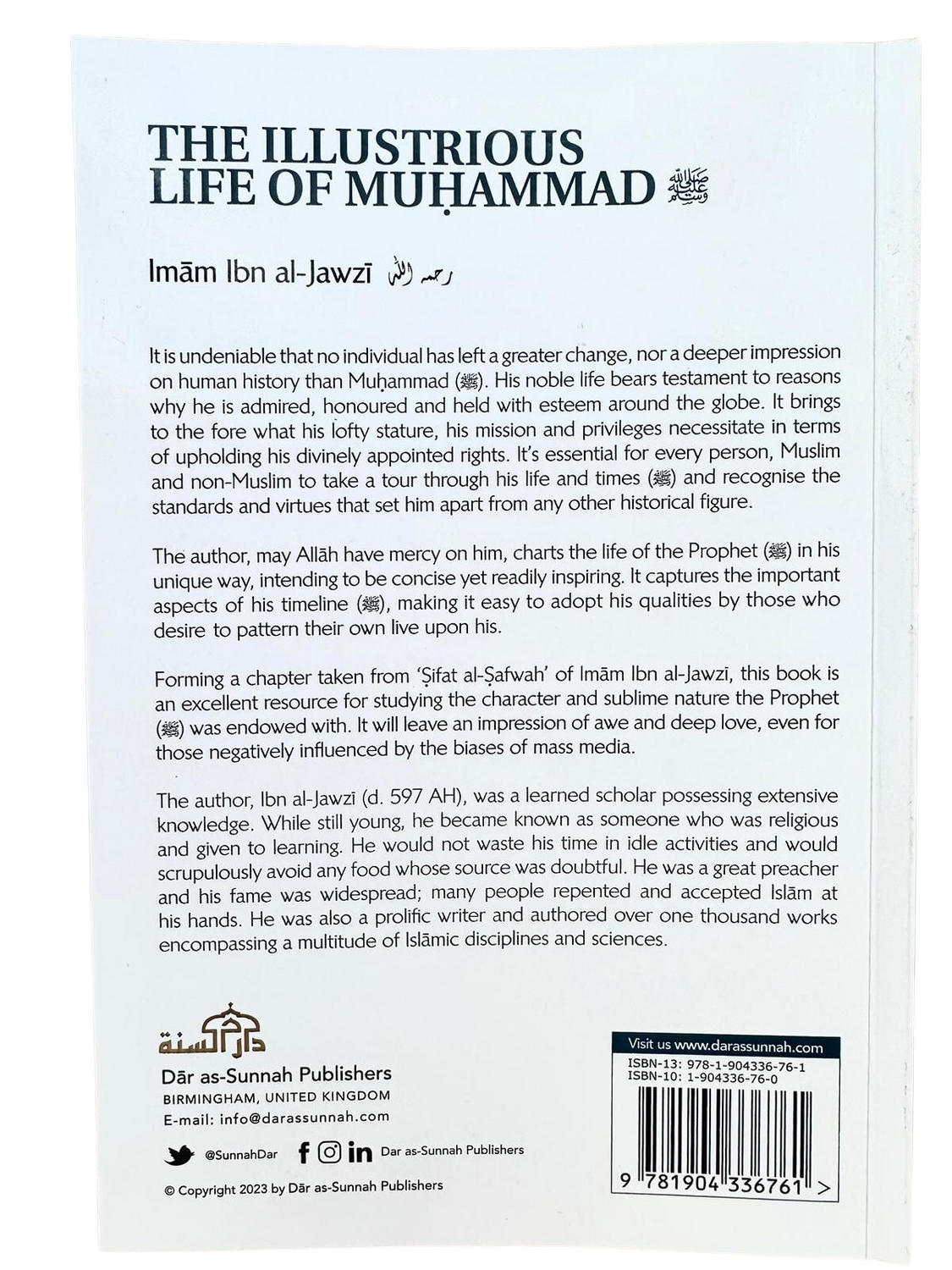
Collapsible content
Description of Book
This book, written by the esteemed author Ibn al-Jawzi, presents a concise yet inspiring depiction of the life of the Prophet Muhammad (peace and blessings be upon him). Covering significant stages and virtues of his life, it serves as a valuable resource for studying his character. Known for his knowledge and religious fervor, Ibn al-Jawzi became a renowned preacher and prolific writer, with over one thousand works on various Islamic disciplines and sciences. By delving into the life of the Prophet (peace and blessings be upon him), readers are sure to gain a deep admiration and respect for his noble stature and enduring influence on human history.
Publisher
Dar As Sunnah Publications
Author
- IMAM IBN al JAWZI
Sample Pages - Content
Page : 01
DAR AS-SUNNAH CLASSIC COLLECTION The Illustrious Life of Muhammad Imam Ibn al-Jawzi THE ILLUSTRIOUS LIFE OF MUHAMMAD Imām Ibn al-Jawzī رحمہ الله
Page : 02
al-Hafiz Abu'l-Faraj ibn al-Jawzi [d. 597AH] The ILLUSTRIOUS Life of MUHAMMAD being a translation of a chapter taken from his 'Sifah al-Safwah' السنة
Page : 03
1.10. What happened to Him () after the Death 1.8. Those who breastfed him (). 1.9. The Death of His () Mother, Aminah........ of His () Mother, Aminah.. 26 .31 1.11. Abu Talib's Guardianship of the Prophet ().....32 1.12. The Story of Bahirah the Monk.. 31 1.29. The Duration of the Messenger's() Stay in Makkah after Prophethood....... 1.30. In the Season of Hajj....... ..65 .66 1.31. The Events of Al-'Aqabah and how ..33 they Unfolded..... .67 1.13. His () Shepherding......... ..35 1.14. His() Second Departure to the Levant.. ..36 1.32. The Messenger's () Migration to Madinah.........71 1.33. The Story of Umm Ma'bad.. .81 1.15. The Marriage of the Messenger() to Khadijah (radiy Allahu 'anha). 1.34. What happened to the Messenger () when He Reached Madinah.... .83 .........37 1.16. The Signs of Prophethood before the Comming of Revelation... .38 1.17. His () Participation in the Rebuilding of Ka'bah..... .39 1.18. The Beginning of Revelation... 40 1.19. The Manner in Which Revelation Came to Him()... 43 1.20. Shooting Stars being thrown at Jinn upon His() Advent......... 1.35. The Paternal Uncles of the Messenger().. 1.36. The Paternal Aunts of the Messenger(). 1.37. The Wives of the Messenger(). 1.38. The Concubines of the Messenger () 1.39. The Sons of the Prophet (). 1.40. The Daughters of the Prophet(). 1.41. The Slaves of the Prophet (). 1.42. The Bondmaids of the Prophet (). 1.43. The Mounts of the Prophet ().. .84 .85 .85 .85 .86 ..86 ..87 ..88 ..88 ..45 1.21. The Acknowledgment of His () 1.44. The Description (sifab) of the Prophet (). 1.45. His () Good Manners (busn khuluq). ..89 ..95 Prophethood by the People of the Book... .47 1.46. His() Humbleness (tawadi.. ..96 1.22. The Beginning of the Messenger's () Preaching to Islam..... 1.47. His() Modesty (biya)... ..98 49 1.23. Some of his () Miracles..... 49 1.48. His () Compassion (shafqa) and Indulgence (mudarat)..... 98 1.24. Some of his () Telling of the Unseen........ 1.25. Some of the Grievance that the Messenger () patiently endured from the disbelievers...... 1.26. The Night Journey (al-isra') and the Ascension (al-mira))... 54 1.49. His () Patience (bilm) and Forgiveness (sifh). .99 57 1.50. His () Joking (muzah) and Banter (muda'aba). .101 ..59 1.27. The Story of His (*) Heavenly 1.51. His () Generosity (karm) and Openhandedness (jawd)... .102 Ascent (miraj).. 59 1.52. His () Courage (shujaa).. ..103 1.28. The Messenger's (*) Order to his Companions to Migrate to Abyssinia.. ..64 1.53. His() Superiority (fadl) and High Eminence (ulu qudr) among the Prophets ('alayhum-salam)... 104
Page: 04
1.54. The Analogy of Him() and the Prophets (al-anbiya) before Him..... 1.55. The Analogy of Him() and the Message with which Allah sent him.... .108 108 1.56. The Angels walking Behind Him(). 1.57. The Obligation to Put His () Love .109 (mahabbah) ahead of Oneself, One's Child (walad) and One's Parent (walid). .109 1.58. The Companions' Veneration (ta'zim) and Love (bubb) for the Prophet ().... .110 1.59. The Worship ('ibadah) and Diligence (ijtihad) of the Messenger(). .111 1.60. His () Living ('aish) and Poverty (faqr). .115 1.61. The Number of His () Battles (ghazawat) and Brigades (siraya)... .118 1.62. His () Eloquence (faṣaḥa). .118 1.63. Some of His () Perfect Words (al-mutqan) and Amazing Parables (amthal).. .119 1.64. His() Demise...... ..124 1.65. Abu Bakr Informing the People of the Messenger's () Demise........ .129 1.66. The Mourning of Fatimah for Him (). .130 1.67. His () Age upon Death.. 131 1.68. The Burial Bath (ghush) of the Messenger()...... 131 1.69. The Location of His () Grave...... .132 1.70. Prayer (Supplication) for Him().. .133 1.71. The Blessing (salam) of His Ummah Reaching Him() and Returning the Blessing (salam) to those who send them.... .178 THE BIOGRAPHY OF THE AUTHOR al-Hafiz Abu'l-Faraj 'Abdu'l-Rahman Ibn Jawzi His Name and Lineage He is Abu'l-Faraj Jamal al-Din 'Abdu'l-Rahman ibn 'Ali ibn Muḥammad ibn 'Ali Ibn 'Ubayd Allah Ibn al-Jawzi al-Qurashi al-Tamimi al-Bakri from the family of Muhammad ibn Abu Bakr al-Siddiq, al-Baghdadi, al-Hanbali.' His Birth and Upbringing He was born in 509 or 510 A.H. Upon reaching adolescence, his aunt took him to Ibn Naşir from whom he learned a great deal. He came to love preaching while barely having reached the age of pu- berty, and from then started to give sermons to the people. His father passed away when he was three years old so his aunt Thail al-Raudatain, p.21, al-Bidayah wa'l-Nihayah, p. 13/26. 10
Page : 05
THE ILLUSTRIOUS LIFE OF MUHAMMAD to Allah's Order.' When I left, I heard a voice saying: 'I have passed My Order and have lessened the burden of My Worshipers.' It is narrated by both Bukhari and Muslim, 89 Ikrimah conveyed on the authority of Ibn 'Abbas (radiy Allahu 'an- buma) that the Messenger of Allah () said: "I saw my Lord [Blessed and Exalted]." It is narrated by Imam Ahmad." Section Twenty-Eight: The Messenger's () Order to his Companions to Migrate to Abyssinia When the Messenger of Allah () began preaching Islam publicly, the disbelieving Quraysh declared animosity towards him, so Allah protected him through his uncle, Abu Talib, and he commanded his followers to set out to Abyssinia, saying to them: "There is a king under whose rule no one is oppressed, so seek refuge there until Allah brings to you a resolution." A group of Muslims migrated while others hid their faith. The total number of people who set out to Ab- yssinia were eighty-three men, eleven women from Quraysh and seven outsiders. When they heard of the Messenger's() migration to Madinah, thirty-three men and eight women from there returned; two men of them died in Makkah, seven were captured, and twenty-four of them witnessed the battle of Badr. Bukhari, #249, #3342, #1636, #3207, #3887, #3393 and #3430, Muslim, #163, #164, Nasa', #448, #1399 and #447, and Tirmidhi, #3346. See Imam al-Dha- habi's Sirah al-A'lam al-Nubala', 1/207-228, Tabaqat of Ibn Sa'd, 1/213 and others. "There is a difference of opinion of weather he saw Allah with his eye or his heart. Seeing Him with the eye is not confirmed and it has not been narrated by any of the companions nor from the first generation of the Salaf. Ibn Taymiyyah and Ibn al-Qayyim have discussed this greater detail. And Allah knows best. The Illustrious Life of Muhammad On the seventh year since Migration, the Messenger of Allah (wrote to Al-Najashi inviting him to Islam, and he accepted. He also wrote to him to marry him to Umm Habibah (radiy Allahu 'anha) and to send to him those who remained of his companions, so he did, and they came to Madinah to find that the Messenger of Allah () has conquered Khaybar. Section Twenty-Nine: The Duration of the Messenger's () Stay in Makkah after Prophethood They debated in this regard. Rabi'ah narrated on the authority of Anas (radiyAllahu 'anhu), and Abu Salamah narrated on the authority of Ibn 'Abbas (radiy Allahu 'anhuma) that he stayed there ten years, which is the view narrated from 'A'ishah (radiy Allahu 'anha) and Sa'id Ibn Al-Musayyab. It is also narrated from Ibn 'Abbas (radi Allahu 'anhuma) that he stayed for fifteen years. It is narrated that Ibn 'Abbas (radiy Allahu 'anhuma) said: The Prophet() stayed in Makkah fifteen years; seven years in which he saw the light and heard the voice, and eight in which he received the revelation.' The authentic view is what is narrated by Al-Bukhari and Muslim on the authority of Ibn 'Abbas (radiy Allahu 'anhuma) that the Prophet ()stayed in Makkah thirteen years." The view that said ten years is interpreted as the duration in which he publicised his prophethood. In the beginning after receiving his mission he kept preaching in secret for three years. Moreover, the view that said fifteen years is interpreted to include the period in which he saw the early signs of Prophethood [i.e. before receiving revelation]. 90 See Imam al-Dhahabi's Sirab al-A'lam al-Nubala', 1/146 91 Bukhari, #3903 and Muslim, #2350, #2351 64 65
Page : 06
THE ILLUSTRIOUS LIFE OF MUHAMMAD Section Fifty-Four: The Analogy of Him () and the Prophets (al-anbiya') before Him Abu Hurayrah (radi Allahu 'anhu) reported that Abu'l-Qasim () said: "The analogy of myself and the Messengers before me is that of a person who built a house quite imposing and beautiful to look at. He neared completion of the house, except for one missing brick in one of its corners. People began to walk round it, marvelling at the building, it really pleased them but they said: 'If only this one brick was in its place your building would have been perfect." Muḥammad ()said: "And I am that final brick." It is narrated by both Bukhārī and Muslim.149 Section Fifty-Five: The Analogy of Him () and the Message with which Allah sent him Abu Musa (radi Allahu 'anhu) narrated that the Prophet () said: "My example and the example of the message with which Allah has sent me is like that of a man who came to some people and said: 'I have seen with my own eyes the enemy forces, and I am a clear warn- er to you, so save yourself, save yourself!' A group of them obeyed him and went out at night, slowly and cautiously and they were safe. While another group did not believe him and thus the army took them in the morning and destroyed them. So this is the example of that person who obeys me and follows what I have brought [the Qur'an and the Sunnah], and the example of the one who disobeys me and disbelieves the truth I have brought."""150 19 Muslim, #2286, Bukhari mukhtaşar, #3534 and Tirmidhi, #2862 and #2864. 150 Bukhari, #6482, #7283 and Muslim, #2283 The Illustrious Life of Muhammad Section Fifty-Six: The Angels walking Behind Him() Jabir (radiy Allahu 'anhu) said: The Prophet's () Companions used to walk ahead of him, when he went out, and would leave his back for the angels.' It is narrated by Imam Ahmad.151 Section Fifty-Seven: The Obligation to Put His() Love (mahabbah) ahead of Oneself, One's Child (walad) and One's Parent (walid) Anas Ibn Malik (radiy Allahu 'anhu) narrated that the Messenger ()said: "None of you is a believer till I am more dear to him than himself, his child, his parents and the whole of mankind." It is nar- rated by both Bukhari and Muslim.152 'Abdullah Ibn Hisham (radiyAllahu 'anhu) conveyed that they were with the Prophet () while he was holding the hand of 'Umar Ibn Al-Khattab, and 'Umar (radiy Allahu 'anhu) said: 'O Allah's Messenger! You are dearer to me than anything else, except for own myself." He said: "Not yet! By Him in Whose Hand my soul is, not until I am dearer to you than your own self [you will not have complete faith]." 'Umar said: 'You are now-by Allah-dearer to me than my own self.' The Prophet () said: "Now, O 'Umar [you have completed your faith]." It is narrated by Al-Bukhari alone.153 151 Ahmad in his Musnad, 3/302 152 Bukhari, #15, Muslim, # 44, Nasa', # 5049 and Ibn Majah, #67 153 Bukhari, #4064 108 109
Page : 07
THE ILLUSTRIOUS LIFE OF MUHAMMAD Section Seventy-One: The Blessing (salam) of His Ummah Reaching Him (*) and Returning the Blessing (salam) to those who send them 'Abdullah (radi Allahu 'anhu) conveyed that the Messenger of Allah() said: "By Allah [the Exalted, the Majestic] there are roam- ing angels who convey the blessing of my Ummah to me."208 It is narrated by Imam Ahmad. It is also narrated from Abu Hurayrah (radiy Allahu 'anhu) that the Prophet() said: "No one invokes blessing on me except Allah returns my soul to me in order for me to invoke blessing on him."209 May Allah bless our Prophet Muhammad with Eternal Blessings. 208 Ahmad in his Musnad, 1/441 209 Abu Dawud, #2041 134 INDEX OF ARABIC TERMS 'Ashura: 10th Muharram, the 1st month of the Islamic calender. Ayah. pl. ayat. Sign, miracle, example, lesson, verse. 'Abd: pl. 'ebad. slave, servant, worshipper. Al-Abdal: sing: badal. Sufi: the Substitutes. Abrar righteous. Adhan: fiqh: the call to prayer. Aflaq: phil: celestial spheres. Ahl al-Ma'rifah wal-Ithbat. Suft: The people of knowledge and sub- stantiation. Those endowed with the higher knowledge and verification amongst the Sufis. Anfal spoils of war. The property appropriated from the polytheists while at war with them. Arad: purpose, phil: accidental property. Ata: bestowal of provision/sustenance. Awliya': plural of wali; friend, ally, loyal companion. From the word wilayah meaning loyalty and closeness, the opposite of enmity. 135
Page : 08
THE ILLUSTRIOUS LIFE OF MUHAMMAD Imām Ibn al-Jawzi way maps It is undeniable that no individual has left a greater change, nor a deeper impression on human history than Muḥammad(). His noble life bears testament to reasons why he is admired, honoured and held with esteem around the globe. It brings to the fore what his lofty stature, his mission and privileges necessitate in terms of upholding his divinely appointed rights. It's essential for every person, Muslim and non-Muslim to take a tour through his life and times() and recognise the standards and virtues that set him apart from any other historical figure. The author, may Allah have mercy on him, charts the life of the Prophet () in his unique way, intending to be concise yet readily inspiring. It captures the important aspects of his timeline (), making it easy to adopt his qualities by those who desire to pattern their own live upon his. Forming a chapter taken from 'Şifat al-Safwah' of Imam Ibn al-Jawzi, this book is an excellent resource for studying the character and sublime nature the Prophet () was endowed with. It will leave an impression of awe and deep love, even for those negatively influenced by the biases of mass media. The author, Ibn al-Jawzi (d. 597 AH), was a learned scholar possessing extensive knowledge. While still young, he became known as someone who was religious and given to learning. He would not waste his time in idle activities and would scrupulously avoid any food whose source was doubtful. He was a great preacher and his fame was widespread; many people repented and accepted Islām at his hands. He was also a prolific writer and authored over one thousand works encompassing a multitude of Islamic disciplines and sciences. سنة Dār as-Sunnah Publishers BIRMINGHAM, UNITED KINGDOM E-mail: info@darassunnah.com @SunnahDar fin Dar as-Sunnah Publishers Copyright 2023 by Där as-Sunnah Publishers Visit us www.darassunnah.com ISBN-13: 978-1-904336-76-1 ISBN-10: 1-904336-76-0 9781904 336761">
Imam Ibn Al-Jaywi
Imam Ibn al-Jawzi (1116–1201 CE) was a renowned Hanbali scholar, preacher, and writer from Baghdad. Known for his deep knowledge and eloquent sermons, he authored numerous works on theology, spirituality, and social reform. His notable books include Talbis Iblis (The Devil’s Deception), which warns against subtle forms of misguidance, and Sifat al-Safwah (Characteristics of the Pure), a collection of inspiring biographies. Ibn al-Jawzi’s teachings emphasized moral integrity, repentance, and spiritual awareness, making him a key figure in Islamic thought whose writings continue to guide Muslims toward piety and ethical living.








